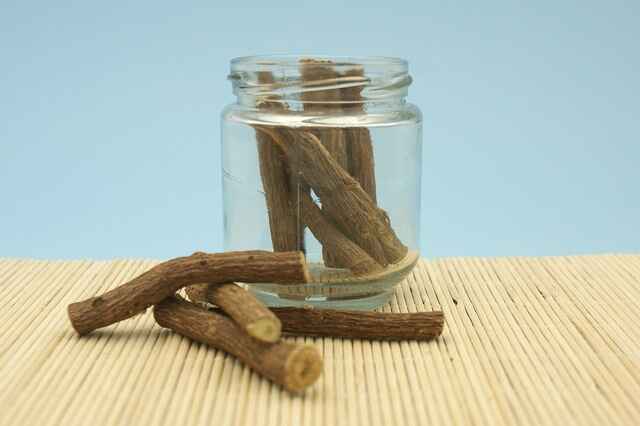One of the most widely used medicinal herbs is Mulethi also known as licorice, and Glycyrrhiza glabra. Here in this article we will talk about health benefits of Mulethi.
What is Mulethi? Licorice or Glycyrrhiza glabra?
Mulethi is a member of the Fabaceae family. It grows as a perennial herb in temperate regions. Roots and runners from plants are the portions that are used, and they are gathered in the autumn. Licorice has been used medicinally for thousands of years in both western and eastern civilizations, and it is one of the most often used medicines in Chinese medicine.
The Greek words “glykos,” which means sweet, and “rhiza,” which means root, were combined to create the name “Glycyrrhiza.” It is grown in India, China, Spain, Iran, Russia, and Italy in addition to its native Mediterranean region. In addition to Jothi-madh and Mulaithi, other names for licorice include Licorice, Liqourices, and Sweet Wood in English and Licorice, Liqourices, and Sweet Wood in Hindi (Sanskrit).
Nutritional Components Of Ayurveda Herb Mulethi
Polysaccharides, simple sugars, proteins, amino acids, iron, zinc, copper, phosphorus, magnesium, manganese, silicon, and selenium are all found in licorice, along with mineral salts such as calcium, sodium, potassium, and many others. Additionally, it has vitamins B1, B2, B3, B5, E, and C. starches, resins, gums, and pectins.
Glycyrrhizin, a triterpenoid saponin that is 50 times sweeter than sucrose, is the main component in the roots. (source).
What Are The Expected Health Benefits Of Using Mulethi?
1. Soothes Respiratory Conditions
Mulethi is widely recognized for its ability to relieve respiratory conditions such as cough, bronchitis, and asthma. It acts as an expectorant, helping to loosen and expel mucus from the respiratory tract, making it easier to breathe.
Source: A study published in the Journal of Ethnopharmacology highlights Mulethi’s effectiveness in treating respiratory ailments due to its anti-inflammatory and antimicrobial properties.
2. Supports Digestive Health
Mulethi has been shown to promote digestive health by alleviating symptoms of indigestion, heartburn, and stomach ulcers. Its soothing properties help protect the stomach lining and reduce inflammation.
Source: Research in the Journal of Digestive Diseases demonstrates that Glycyrrhiza glabra has gastroprotective effects, making it beneficial for treating peptic ulcers and other digestive issues.
3. Enhances Immunity
The herb is known for its immune-boosting properties, helping the body fend off infections and diseases. Mulethi contains compounds that enhance the production of white blood cells, improving the body’s defense mechanisms.

Source: A study in Food Chemistry reveals that licorice root extract possesses significant antioxidant and immunomodulatory activities, contributing to enhanced immune function.
4. Reduces Stress and Anxiety
Mulethi has adaptogenic properties, meaning it helps the body adapt to stress and reduce anxiety levels. It aids in balancing cortisol levels, the hormone responsible for stress, promoting a sense of calm and relaxation.
Source: Findings published in Phytotherapy Research indicate that licorice root can effectively reduce stress and anxiety, making it a valuable herb for mental well-being.
5. Promotes Skin Health
The anti-inflammatory and antimicrobial properties of Mulethi make it beneficial for skin health. It can help treat conditions such as eczema, acne, and psoriasis. Additionally, it aids in reducing hyperpigmentation and improving skin tone.
Source: Research in the Journal of Dermatological Science supports the use of licorice root in treating various skin disorders due to its anti-inflammatory and skin-lightening effects.
6. Regulates Blood Sugar Levels
Mulethi has shown potential in regulating blood sugar levels and managing diabetes. It contains compounds that mimic the action of insulin, helping to maintain blood glucose levels within a healthy range.
Source: A study published in the Journal of Natural Products highlights the antidiabetic properties of Glycyrrhiza glabra, suggesting its usefulness in diabetes management.
7. Supports Weight Loss
Mulethi can aid in weight loss by promoting fat metabolism and reducing appetite. Its active compounds help in breaking down body fat and increasing the body’s metabolic rate.
Source: Research published in Obesity Research & Clinical Practice shows that licorice root can contribute to weight loss by reducing body fat mass and suppressing appetite.
Also Read: Health Benefits of Shallaki: Uses, Precautions & Side Effects

8. (Mulethi) Licorice’s potential benefits for liver
Licorice root’s glycyrrhizin has demonstrated liver-protective properties in viral hepatitis. Glycyrrhizin is a drug that has been created as a liver protector in China and Japan. Glycyrrhetinic acid, a substance present in licorice, has anti-inflammatory and antiapoptotic properties that may have liver-protective effects. (source)
9. Licorice’s potential effectiveness against microorganisms
Licorice extract may be a possible agent against bacterial infection, according to numerous laboratory investigations. Liquorice extract has demonstrated good outcomes in clinical trials when used to treat Staphylococcus aureus and Candida albicans infections. On the other hand, infections need to be diagnosed and treated by a doctor. Before consuming licorice, speak with your healthcare physician if you exhibit any infection-related symptoms. (source)
Precautions You Should Take Before Consuming Mulethi
- Monitoring electrolytes and blood pressure when consuming licorice is advised. It’s also advised to consume more potassium in your diet.
- In patients with a history of hypertension and renal failure as well as those who are already using digitalis preparations, licorice should be avoided.
- When consuming licorice, anyone using insulin or any other oral hypoglycemic medication should keep a watchful eye on their blood glucose levels.
- Since there isn’t enough information on whether licorice is safe to consume while pregnant or nursing, it should be avoided by those who are both.
Side Effects Of Using Mulethi
While there are several health benefits of Mulethi, the following list includes licorice use’s negative effects.
- Licorice consumption on a regular basis is linked to hypokalemia, salt and water retention, and hypertension (below normal levels of potassium in the blood).
- Consuming too much licorice can result in hypoaldosteronism, poor renin activity, and metabolic alkalosis.
- You are urged to consult your healthcare professional about any potential adverse effects before using licorice or any other herbal medication. You’ll be able to prevent negative impacts.
Also Read: Kalmegh Health Benefits, Health Properties, Precautions & Side Effects





